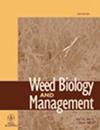Effects of weed infestation on the productivity of hybrid and inbred rice varieties in Myanmar
IF 1.5
4区 农林科学
Q3 AGRONOMY
引用次数: 0
Abstract
Double rice-cropping areas in the dry and wet seasons have been increasing in Myanmar, and hybrid rice has been cultivated throughout the country. However, weeds are often not adequately managed. Therefore, the objective of this study was to investigate the effect of weed infestation on rice production of three hybrid varieties (Palethwe 1, Palethwe 3, and Palethwe Basmati) and three inbred varieties (Manaw Thu Kha, Shwe Thwe Yin, and Sin Thwe Latt) in the dry and wet seasons in a lowland rice field. In the dry and wet seasons, 19 - 20 weed species were naturally infested into the fields. Limnocharis flava was the most abundant weed in both seasons. Weed dry weight and rice grain yield showed a negative linear relationship in both seasons. Manaw Thu Kha showed the highest yield loss in the un-weeded fields in both seasons, while Sin Thwe Latt and Palethwe Basmati showed the lowest yield loss in the dry season and wet season, respectively. Sin Thwe Latt recorded the lowest yield loss of 30.21% on average in both seasons, and the highest yield loss of 60.37% was recorded for Manaw Thu Kha. The average rice grain yield loss of all the varieties in the un-weeded fields was 64.37 and 33.66% for the dry and wet seasons, respectively. Thus, the yield loss in the dry season was 1.9-times greater than that in the wet season. The present research suggests that adequate weed management is necessary for rice cultivation, especially in the dry season in Myanmar.杂草侵害对缅甸杂交稻和自交稻产量的影响
缅甸旱季和雨季双季水稻种植面积一直在增加,全国各地都在种植杂交水稻。然而,杂草往往没有得到充分的管理。因此,本研究的目的是研究杂草侵染对3个杂交品种(Palethwe 1、Palethwe 3和Palethwe Basmati)和3个自交系品种(Manaw Thu Kha、Shwe Thwe Yin和Sin Thwe Latt)干湿季节水稻产量的影响。在旱季和雨季,有19 ~ 20种杂草在田间自然滋生。在两个季节中,黄缕草(Limnocharis flava)的数量最多。杂草干重与水稻籽粒产量在两个季节均呈负线性关系。Manaw Thu Kha在旱季和雨季的产量损失最高,而Sin Thwe Latt和Palethwe Basmati分别在旱季和雨季的产量损失最低。单季产量损失最低的是新都拉,平均产量损失为30.21%,最高的是玛诺都卡,平均产量损失为60.37%。在旱季和雨季,所有品种在未除草地的平均稻米产量损失分别为64.37%和33.66%。因此,旱季的产量损失是雨季的1.9倍。目前的研究表明,适当的杂草管理是水稻种植的必要条件,特别是在缅甸的旱季。
本文章由计算机程序翻译,如有差异,请以英文原文为准。
求助全文
约1分钟内获得全文
求助全文
来源期刊

Weed Biology and Management
农林科学-农艺学
CiteScore
2.70
自引率
0.00%
发文量
13
审稿时长
>36 weeks
期刊介绍:
Weed Biology and Management is an international journal, published four times per year. The journal accepts contributions in the form of original research and review articles in all aspects of weed science. Contributions from weed scientists in the Asia–Pacific region are particularly welcomed.
The content of the contributions may relate to weed taxonomy, ecology and physiology, weed management and control methodologies, herbicide behaviors in plants, soils and environment, utilization of weeds and other aspects of weed science. All contributions must be of sufficient quality to extend our knowledge in weed science.
 求助内容:
求助内容: 应助结果提醒方式:
应助结果提醒方式:


